A Boring Compliment and What it Taught Me
The Compliment
If you were to ask one of my friends to describe me, one of the first words they'd use is “consistent.” I know because it’s happened over and over again.
For a while, I thought that was kind of a boring compliment. What about “fun,” “wise,” “the most beautiful person in the universe” or “the human version of a sunrise”?
When I heard my friends say “consistent,” I figured they were talking about my routines. I do have a morning rhythm that includes prayer, scripture, journaling, and reading—though, if I’m being honest, I’m only kind of consistent with it. Or maybe they meant the fact that I eat the same meals almost every week. (I’m a single woman cooking for one—can you blame me?)
But lately, I’ve been thinking more critically about what they might mean.
For example, I can see how I’ve practiced consistency in my professional life. I would suggest that professional consistency is showing up with the same level of integrity, work ethic, and attitude—regardless of the environment or circumstances. It’s doing your job well, even when recognition is absent. It’s being reliable in how you communicate, follow through, and lead. People trust professionals who are predictable in the best way: they know what to expect from you, and they don’t have to guess if you’ll deliver. Consistency in this area builds credibility over time. It shows emotional maturity, and it helps create stability for those around you. Whether in a leadership role or part of a team, professional consistency sets the tone for how others engage, respond, and grow.
But the more I reflect, the more I realize that what people remember most about me isn’t the work I’ve done—it’s how I’ve shown up for them over time. Relational consistency includes our professional relationships, but it reaches beyond habits and tasks. It’s rooted in our personal values—the way we treat people, the steadiness we offer, and the trust we build through presence and care.
What Is Relational Consistency?
Relational consistency means being dependable in how you relate to others, especially when life gets messy. It’s about showing up with steadiness, not perfection. It’s choosing to listen even when you disagree. It’s staying kind when you feel misunderstood.
Relational consistency means:
You have conversations even when it is hard.
You press into relationship even when it feels uncomfortable.
Your goal in conflict is understanding, not proving the other person wrong.
You stay true to your values, not just your feelings.
When I think of my closest relationships, every one of them has been through conflict, disagreement, or seasons of disappointment. That’s normal in any meaningful connection. What made those relationships stronger was not avoiding the hard moments, but staying consistent through them.
Why Does Relational Consistency Matter?
1. It Builds Trust Over Time
Trust isn’t built in one grand gesture. It’s built in small, consistent ways. Showing up, telling the truth gently, keeping your word, and treating people with respect.
When people know how you'll treat them, they feel safe around you. And when people feel safe, they’ll open up, lean in, and grow.
2. It Strengthens Teams, Families, and Communities
In leadership and in life, people don’t necessarily want smart or charismatic leaders. They want people who make them feel understood and championed. Most people want relationships who help bring stability in the midst of uncertainty or change. (Even the good kind!)
If you’re the same person on a good day as you are on a hard day, your team will feel grounded. Your kids, your friends, your coworkers all benefit when they don’t have to wonder if you are going to withdraw from the relationship.
3. It Grows Maturity and Self-Control
Let’s be real: life is full of challenges. People will hurt your feelings. Things won’t go as planned. But relational consistency means responding, not reacting.
It’s a form of emotional leadership. You choose to lead with your values, not your emotions. That’s not easy—but it’s powerful.
Three Ways to Practice Relational Consistency
1. Stay Present in the Hard Moments
It’s easy to show up when things are good, but relational consistency shows up during the hard times. It is uncomfortable and maybe even painful to be with someone in their hurt, but it speaks volumes about who they can be with you.
2. Value Understanding Over Agreement
Our world is becoming increasingly polarized. If we only surround ourselves with people who agree with us, we will create an echo chamber around us. You don’t have to agree with someone to stay connected. Ask questions like, “Help me understand where you’re coming from?”
Understanding is what keeps connection alive - even during conflict.
3. Choose Honor
Relational consistency means you will see people at both their best and their worst. Choosing honor in those moments means refusing to define someone by their lowest point. It means calling out the gold in them, even when the dirt is visible. Honor celebrates what is true and good. Celebrate others publicly, speak life over them intentionally, and remind them who they are. Especially when they forget.
Final Thoughts: You Can Be a Safe Place
Relational consistency doesn’t require perfection—it requires intention. When we become safe, steady people, others can breathe easier around us. They don’t have to tiptoe or guess what mood we’re in.
They know what to expect.
They know they matter.
And they know they can trust us—even on the hard days.
That’s the gift of relational consistency. And it’s a gift worth giving.
Bridges are made up of triangles because they are the strongest shape. Relational consistency is just one of the "triangles" that a relational bridge is made up of!
